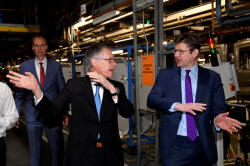|
PSA, which last year acquired Opel/Vauxhall from General Motors
<GM.N>, will build Peugeot and Citroen models as well as the
next Vauxhall Vivaro van in Luton, north of London. Production
will rise to 100,000 vehicles from 60,000 in 2017.
The French group, which is locked in labor talks with Opel's
German workers, said the Luton investment was helped by
"responsible social dialogue with the Unite union guaranteeing
production flexibility", as well as UK government support.
The union said 350-400 jobs would be created as a result of the
investment, which PSA said would amount to about 100 million
euros ($123 million). Around 1,400 people are currently employed
at the site, which is Britain's only van plant.
The announcement is a boost to Prime Minister Theresa May ahead
of talks to decide Britain's long-term trading relationship with
the European Union, although PSA Chief Executive Carlos Tavares
underscored the need for free trade.
"I take on board the assurances that the UK government have
provided us on seeking tariff-free and frictionless trade with
the EU going forward," he said at the plant on Wednesday.
"There is still work to do to ensure frictionless trade."
The Vivaro, which currently shares underpinnings with Renault's
<RENA.PA> Trafic van, will in future be assembled on PSA's EMP2
vehicle platform.
That will allow production of the Peugeot Expert and Citroen
Jumpy to be introduced in Luton, the group said, confirming an
earlier Reuters report.
After rescuing PSA from near-bankruptcy in 2013, Tavares is
negotiating new union deals for Opel/Vauxhall as he pursues an
ambitious restructuring plan designed to restore the division's
profitability by 2020.
Raising pressure on Germany's IG Metall union, the division's
German CEO Michael Lohscheller underlined that new deals had now
been struck with workers in Britain, Spain, Austria, Hungary and
Poland, allowing investment in their sites.
The latest UK investment safeguards the Luton plant's future for
"many years to come", Lohscheller said on Wednesday.
PSA said it needed to boost van output to meet growing demand
but could wait until 2020 to decide on future car production at
its Ellesmere Port factory in northwest England, where the run
of its current Astra Sports model does not end until the next
decade.
The British government is contributing 9 million pounds to the
van investment as part of its push to support the UK automotive
industry, which employs over 800,000 people and generates
revenue of 77.5 billion pounds ($110 billion).
(Reporting by Costas Pitas; Writing by Laurence Frost and Costas
Pitas; Editing by Mark Potter)
[© 2018 Thomson Reuters. All rights
reserved.] Copyright 2018 Reuters. All rights reserved. This material may not be published,
broadcast, rewritten or redistributed.
Thompson Reuters is solely responsible for this content.
 |
|




